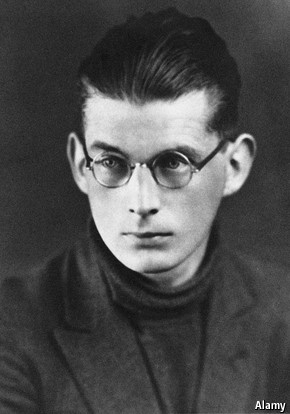
“Echo’s Bones”, written by Samuel Beckett just over eight decades ago, must be the oddest publication of the year. Commissioned in 1933 by Charles Prentice of Chatto and Windus, it was to be the final component in what would become Beckett’s first published book of fiction, “More Pricks Than Kicks” (1934).
Made up of ten short stories, “More Pricks Than Kicks” would have run to 11 had “Echo’s Bones” not been rejected by Mr Prentice. He had told Beckett that another story would “help the book” (in other words make it bulkier), if the writer managed “to reel [the words] out”. But Mr Prentice hated the extra text Becket submitted. It was “a nightmare”, he wrote. “It gives me the jim-jams.” Beckett, then 27 years old and desperate to be published, agreed that it should be dropped and remembered the book as a "fiasco".
Common to most of the “More Pricks Than Kicks”
stories is Belacqua Shuah, an aspiring poet living, like his creator,
in Dublin. He is physically unprepossessing, has a drink problem and an
inability to love the women he obsesses over and, in three cases,
marries. Beckett took Belacqua’s name from Dante’s “The Divine Comedy”.
There Belacqua is an indolent lute maker, curled up in embryonal shape
in purgatory having abandoned an attempt to reach heaven; Beckett’s
version is hobbled by a similar absence of ambition. At the end of
“More Pricks Than Kicks” Belacqua dies.
“Echo’s Bones” has had an unusual genesis. Like “Dream of Fair to Middling Women”, Beckett's first written fiction and the origin for many passages later transferred to "More Pricks that Kicks", it remained unpublished in his lifetime. In the early 1960s Beckett gave the typescripts of both to an American academic, Lawrence Harvey, who in turn left them to Dartmouth College, New Hampshire. In 1986, three years before his death, Beckett finally allowed two people to work on “Dream of Fair to Middling Women” for publication, on the proviso it would only be published after his death; he opposed “Echo’s Bones” ever seeing the light of day. Faber and Faber eventually secured from the writer’s estate permission to publish it.
Once, Beckett experienced only woe with publishers. None of his early work in English was reader-friendly. Novels such as “Murphy” (1936) and “Watt” (written in the Second World War but not published until 1953), regarded today as comic classics, had a wretched time even getting past an editor’s door. After the war, during which he was on the run in France from the Gestapo, he began to write in French. In 1952, his surprise masterpiece, the play “En attendant Godot” (“Waiting for Godot”) made him famous. In 1969 he won the Nobel Prize for literature.
“Echo’s Bones” is firmly Beckett-before-fame. Chock full of obscure vocabulary, it has nonetheless a tortured ingenuity and bright notes of phrasing—pre-echoes of the renowned “music” of the plays. The story is a peculiar fairytale, in which the oddball anti-hero—pulled from his grave—converses with a prostitute, Zabrorovna, a golf-playing giant, Lord Gall, and, in the cemetery where Belacqua was buried, a “groundsman” called Mick Doyle.
Gall, who is impotent, insists that his lands can only be preserved if his syphilitic wife is successfully impregnated by the ghost-like Belacqua. Belacqua himself later turns into a pile of stones. It is profoundly weird; Beckett clearly wanted to make his reader work hard. But he must have hoped to raise some laughs too. There are some classic deadpan Beckettian moments. When Belacqua, knowing that decency is alien to him, hopes to feel sympathy for Zabrorovna he is “sorely tempted to try, that was the bitch of it”. Elsewhere we see Beckett's theological flippancy—“Is there more God in an elephant than in an oyster?” Belacqua muses—and his knack for depicting Dickensian eccentricity in people’s attire. “Doyle was naked save for his truss and a pair of boots which sparkled and crackled in the moonlight.” There is much to draw out a smile but little of the outright hilarity found in “Watt”.
Faber’s “Echo’s Bones”, an elegant, 138-page hardback edited by Mark Nixon—with endnotes six pages longer than the story—is an exemplary piece of scholarship, and would make a good gift for a Beckett aficionado or collector. If you are neither, you may want to stick to “Murphy” or perhaps the very funny “Molloy” (1951), during the writing of which “Waiting for Godot” came into the world. “Echo’s Bones”, with its comic brio and ostentatious learning, is a significant link between a novice intellectual and the mature author of one of the 20th century’s most celebrated plays. By the time he wrote the latter, “Echo’s Bones” must have seemed as odd to its creator as it does to us 80 years after he was asked to write it.
